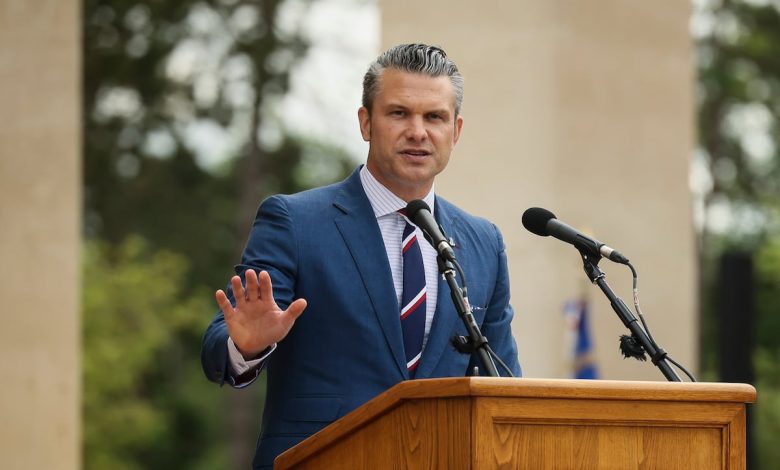In looming Hegseth hearings, Republicans may air their budget peeves

The first time Pete Hegseth testified before Congress the hardest questions he faced were from Democrats who accused him of sexual and alcohol abuse — both of which he denied as “anonymous smears.”
Now, as America’s defense secretary returns to Capitol Hill for a week of testimony, he’s likely to get sharper questioning from his own party.
After five months atop the Pentagon, Hegseth has dismissed top U.S. officers, slashed the Defense Department’s workforce and fired much of his own staff. For a defense secretary confirmed by the narrowest margin possible, the rapid changes have concerned even some Republican members of Congress.
“This is it. This is really the first oversight” of Hegseth’s time as secretary, said Mark Montgomery, a retired rear admiral and former Senate Armed Services Committee aide.
Alongside Chairman of the Joint Chiefs of Staff Gen. Dan Caine, Hegseth will testify in multiple hearings focused on defense spending. But in an unusual twist, these hearings will occur without the Pentagon actually releasing its budget request, which is already months late.
As in his January hearing, Hegseth will likely face blistering criticism from Democrats aghast at his handling of the Defense Department — from sharing sensitive attack plans on a group chat to tasking the U.S. military with more missions on American soil.
But he may also face hard questions from Republicans, many of whom have publicly chafed at the administration’s plans for military spending.
In May, the administration asked Congress for a $892.6 billion base defense budget, of which around $850 billion would go to the Pentagon. The number amounts to a cut when accounting for inflation.
“It’s going to be hard to say you’re actually putting forward a ‘Peace through Strength’ policy when you’re asking for less money than your predecessors projected,” said Elaine McCusker, a top official in the Pentagon’s comptroller office during the first Trump administration.
Per the scarce budget documents already released by the administration, the Pentagon’s procurement account is poised for a major cut — almost $20 billion less than the Biden Pentagon had projected, McCusker said. The drop could harm some of the administration’s top priorities, such as the Golden Dome missile defense system and investments in shipbuilding, both of which are also popular in Congress.
“It appears the Trump administration’s [fiscal year 2026] defense budget request will double down on the Biden administration’s material neglect for the glaring national security threats challenges about which they speak with great alarm,” chair of the Senate appropriations subcommittee on defense Mitch McConnell, R-Ky., wrote in a May statement.
Both McConnell and Chair of the Senate Appropriations Committee Susan Collins, R-Maine, voted against Hegseth’s confirmation.
Many top Republicans in Congress are calling for the kind of military buildup the administration is asking of its European and Asian allies — closer to 5% of GDP spent on defense.
The administration has defended its budget by saying it’s not the only military spending planned for this year. Congress is also debating a massive party-line bill that would include $150 billion for defense, spread over four years. This bill includes much of the money slated for top priority weapons purchases, like missile defense and warships.
“This budget provides that level [of spending] while ensuring that only Republican-votes are needed by using reconciliation to secure those increases without Democrats insisting on increasing wasteful government,” Office of Management and Budget Director Russell Vought posted on X in May.
Still, such supplemental defense bills haven’t been counted as part of the defense budget in the past and would introduce new uncertainty. Pentagon officials plan the funding for major weapons programs years into the future to make sure funding is predictable. If, say, Golden Dome is only funded in a stand-alone spending bill, then there’s no guarantee it will get more money in the future.
“The appropriate defense budget isn’t that you give it a huge chunk of change but that you grow it year over year,” Montgomery said.
Privately, some Republicans are also concerned about the increased use of U.S. forces on American soil to support immigration enforcement. Some 9,000 active-duty troops have either been deployed to the southern border or are approved to do so.
Such missions are under even higher scrutiny after the protests in Los Angeles against the Trump administration’s recent deportations in the city. Over the weekend, Trump called up 2,000 National Guard troops to protect officials carrying out the mission. California Gov. Gavin Newsom, a Democrat, has decried the choice and said he plans to sue for their removal.
Meanwhile, U.S. Northern Command posted on X Sunday that parts of an infantry brigade team from the California National Guard have already begun deploying to Los Angeles.
Hegseth, who has said active duty Marines may follow, shared the post from his personal account.
Noah Robertson is the Pentagon reporter at Defense News. He previously covered national security for the Christian Science Monitor. He holds a bachelor’s degree in English and government from the College of William & Mary in his hometown of Williamsburg, Virginia.







